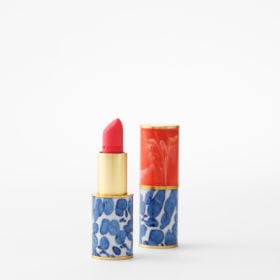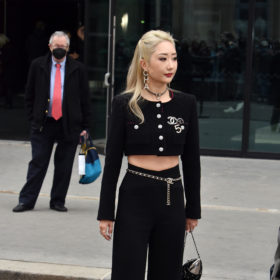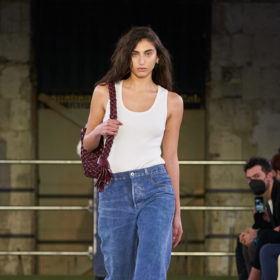
March 05, 2021 at 05:30PM
Self-taught makeup artist, photographer and entrepreneur Danessa Myricks has never been one to chase trends. Following an abrupt career change in her thirties which led her to makeup artistry, Myricks has paved her own way in the industry — and it’s paid off. After years of consulting and working in product development, creating some of the most well-known offerings for brands like KISS and Benefit Cosmetics, Myricks launched her own brand, Danessa Myricks Beauty. Earlier this year, the brand partnered with Sephora in the U.S. and Canada, launching online on February 26 and in stores next month.
Myricks is recognized as a trailblazer and pioneer in the world of truly diverse and inclusive makeup. Recently, Vancouver’s Blanche Macdonald Centre, a school for makeup, hair, esthetics, fashion and nail artistry, partnered with Danessa Myricks Beauty to expand on their range of foundations offered in classes, adding in a wider selection of deeper shades in every makeup kit and every makeup course. “We chose Danessa Myricks Beauty for our kit expansion because she is an innovative artist who believes everyone should be able to have the freedom to enjoy makeup,” says Makeup Program Director, Tracey Payne. “Danessa’s core values are in perfect symmetry with our culture here at the Blanche Macdonald Centre and we are very pleased to bring more diversity into our kits. It’s also an excellent opportunity for our students to learn about new inclusive lines and Black-owned companies and entrepreneurs.”
We spoke to the incomparable Danessa Myricks about her rich and fascinating journey into editorial and celebrity makeup artistry, her ongoing mission to bring diverse makeup ranges to everyone, and the missteps that have occurred during the “50 shades of foundation” revolution.
On her start as a makeup artist
“I’ve always just loved beautiful things. At the time, Russell Simmons had just launched a magazine called OneWorld Magazine and I was determined to work there. So I happened to be at a club — I’m a New York girl so of course I was at a club with a girlfriend — and Russell Simmons was there. I walked up to him and said, ‘I love your magazine. How can I work there?’ I was so ignorant to how the process worked. I’d never done anything like that in my life. But he gave me the name of someone to contact at the office, and ironically OneWorld was owned by the same person who ran the beauty magazines [I was working for at the time]. So I wound up on the publishing side of beauty. And that’s how it all began.
ADVERTISEMENT
ADVERTISEMENTKate Spade Autumn/Winter Sale |
“During that time I would see makeup artists and photographers who’d been hired [by the publishing company], and I was just enamoured by the transformations they were able to create. I was very corporate and nerdy at the time. When people [I knew back then] see me now they don’t even recognize me. But I always had such a great admiration for the art. One day the owner of the company came to me and was like, ‘I’m going to be closing the business and I just wanted to give you a heads up because you have kids.’ And I was devastated. My life flashed before my eyes. Up until that point I had been working [corporate] jobs that I wasn’t passionate about, so eventually I thought maybe in this second [phase] of my life, I can actually enjoy what I’m doing and feel excited to get out of bed every day. So I made a decision to become a makeup artist, in that moment.”
View this post on Instagram
On the lessons she learned during that uncertain period of her life
“Obviously, my transition out of publishing was a bit forced. I was a 30-year-old single mom of two, and I can vividly remember multiple nights where I lay on the floor crying, thinking ‘What does my life look like now?’ It was super scary, but the prospect of doing the same thing [that I had been doing] over and over again, that was painful and unbearable. I was encouraged by what my life could be, so I was willing to take the risk, feel the fear and move forward anyway. Sometimes forced pivots end up being the best for us, because we may not have made the decision to do the things that we’ve always wanted to do if it were not for them. The universe works in mysterious ways to force us to get up off our butts.”
On trusting your gut
“I think our heart and our gut are two things we take for granted. When we feel something in our heart, we tell ourselves it’s just fairytale, [thinking] that it’s not real. And then when we feel something in our gut, we second guess ourselves. But it always works out that when you follow your heart and your gut. That’s when all the magic happens. So in creating my brand, it’s always gut and heart first, and then I figure the rest out. That’s usually where all of our inspiration and creativity lies — in those first thoughts, before the questioning begins, before all the things that we’ve experienced in our lives [leading up to that moment] and all the rejection and the fear [come creeping in]. That first thought is usually the one.”
View this post on Instagram
On people who have opened a door for her
“I have so many, starting with my sixth grade teacher. I wrote my exams for school and scored the highest in the regional exams, but they announced somebody else’s name [as the highest scorer] instead. It was a time when people didn’t want to see a person of colour in such a [prominent] space. My sixth grade teacher pulled me aside and told me, ‘In your life, this is going to happen to you over and over again. But never forget what’s possible for you.’ And I never forgot that. She helped me understand that you’re not always going to be chosen, and it’s not always going to be about whether you’re smart enough or whether or not you’re the best. I learned that very early on.
“When it came to my experience in the beauty industry, the photographer who really held my hand and allowed me to work as an artist, even when I was clueless and terrible, was Eric von Lockhart. It’s because of him that I was able to get published in so many magazines and work with celebrities, because he took a shot on me. He believed in what I was trying to create. Then there was James Vincent, an incredible artist and voice in the beauty industry. He introduced me to The Makeup Show. He saw me teaching at a school in Baltimore and he was like, ‘You need to be in bigger spaces and on larger stages. People need to know who you are.’ He opened up a whole new world for me.
“Even people like Sheika Daley, who’s an incredible makeup artist who works with Zendaya — she’s always been an example for me (from afar) of what’s possible as an artist. She’s quietly doing her thing and killing it it, but she always finds time to pop into my DMs to send me an encouraging message, like, ‘People see you. We know what you’re doing. Keep creating.’ Things like that make a huge difference. When you hear those words from people you admire and respect, it tells you that you’re doing something meaningful and purposeful. It creates a shift for you.”
On being a mentor for others
“[Being helped by those people] is one of the reasons why I started the Angels program. The goal is finding people who love makeup and beauty who need somebody to see them and offer them mentorship. The people who supported me in the growth of my brand, I make sure that they’re supported as well, [whether that means] taking in artists to live in my home, making sure they get work and that their names are being mentioned and making sure they’re in the right spaces. When I first started, there was really no one to ask [for guidance]. The industry was very different back then. You could only move forward through mentorship — if you were someone’s assistant and then you became the person. But I was just this random person; I knew no one. And I remember how hard it was; even if I just wanted to know what powder I should use, there was nobody to ask. And I remember how getting bits and pieces of information literally changed my career. Just little bite-sized pieces [of advice or information] would change everything. So knowing how I struggled, and how [not having someone to ask] slowed down my growth, it’s important to me [that others don’t experience that]. I know how the other person is feeling when they ask a question. It’s not going to take anything away from me to answer it, but I know it’s going to create a big shift for them. When you’ve had those experiences yourself, you cannot help but reciprocate.”
On getting into product development
“I was at a trade show and someone from KISS approached me, wanting my help with creating products for women of colour. I started by creating a lash collection for them, called i.Envy lashes. Then after that experience, brands started to learned my name and would ask for the same type of help. It was just word of mouth. People knew I’d come in, look at their assortment of products, provide honest feedback about how they worked, who the products were for, and so on and so forth. That’s why I was asked by Benefit Cosmetics to consult. After a day with them, they asked me to work full-time as the Director of Product Innovation. And I was there for five years doing all of innovation, and worked on their brow launches specifically. Designing and developing that collection is one of my proudest moments.
“I was creating products very ignorantly in the beginning, because I really just had no clue. But consulting ended up being the best masterclass and hands-on experience. I was traveling all over the world to different labs, learning how products were made, who was making them, who was making those decisions, and even learning about how to present to get them distributed.”
On launching Danessa Myricks Beauty
“After consulting for other brands, I started to think, ‘I love that I was able to help other brands create their thing, but sometimes their thing is not my thing.’ I really wanted to have a voice because at that point, I had a lot I wanted to say. So I decided in 2015 to launch Danessa Myricks Beauty officially.”
ADVERTISEMENT
ADVERTISEMENTSports Direct Free Delivery on All Orders! |
View this post on Instagram
On her heartbreaking first foray into makeup as a teen
“The way I discovered beauty, personally, helped me define what I want my brand to be. I had really severe acne in junior high school, and I was already a really shy girl, so I was bullied a lot. My mom took me to every store to find foundation [to cover my acne] and there wasn’t a shade for me anywhere. In the end we had to go to a costume store and buy stage makeup, because that was the only place we found my shade of foundation. And even then it’s not like it was a perfect match. It was that cake-y makeup where you have to soak the sponge before applying it. That’s what I used. And I’ll never forget how horrifying that was. But a theatre store was the only place I was able to find something that came close to representing my skin tone. It was a very defining moment for me.
“So now, I’m always thinking about that person when I create products. If Danessa Myricks Beauty is the first place they come to try and get an answer, I want them to be able to find it here. I need people to feel like they can come to us and feel good and see that there’s something that represents them. As I’m creating, I’m always thinking about the people who are unseen, the ones who no one’s championing and no one’s creating for, because I know how it feels to not even be a thought in someone’s mind. Makeup can be healing. People use makeup to say who they are, to say what’s in their heart. Danessa Myricks Beauty is always going to be that heart place. So I’m happy that things happened for me the way they did, even though of course it didn’t feel good in the moment. But it gave me perspective on how to really create.”
On the beauty industry’s changing landscape and diversity mission
“It’s been an interesting shift. Some brands are doing it authentically and really have a desire to serve a broader community, and they’re adopting [a message of true diversity and inclusion] and really working towards the goals they said that they were going to do when they put up that black box [on Instagram]. And then there are some brands who are doing it very inauthentically. You can tell it’s very performative and nothing has actually changed. But consumers are responding and wanting to support brands who support them and who think about everyone when they’re creating.”
On diverse shade ranges outside of the foundation category
“When I launched Danessa Myricks Beauty, I decided to tackle highlighter first. Every single highlighter I’d seen or used was ashy on darker skin tones. I wanted to see something that was radiant. I launched four shades of a highlighter called Enlight Halo Powder. But those four quickly turned into 11, because I was like, ‘There are people who are missing from this conversation.’ And the from there I developed the complexion products and then everything else.”
On misguided attempts at inclusive shade ranges
“First of all, 100 shades is confusing for a customer. Even 50 shades can be very confusing. And when all the shades are a millisecond away from each other, you know that brand just wanted to tell a story and wasn’t really thinking about the consumer. Especially when you get to the dark end of the range and you see that all they did was add black pigment, or even worse, add red pigment, to make the deeper shades. It’s very thoughtless. And you’ll see [the darker shades] sitting untouched on the shelf. They’re not going to sell because they’ve been [thoughtlessly formulated]. It’s a self-fulfilling prophecy, and the brands end up selling the same shades they sold before. Those brands will then decide, because of sales numbers, to [remove] the darker shades from their lineup and then they wonder why the one or two dark shades they left also don’t sell. If I go up to a counter and see that, I’m not even looking at that brand anymore. It’s a never-ending cycle. And it tells me that no one at the brand cared to test the product on people of colour before launching. Or, if they did test, then they didn’t care if it didn’t perform, which is even worse. Inclusive makeup is way beyond shades. It’s about formulation on every level.”
The post My Story: Legendary Makeup Artist Danessa Myricks on Authentic Diversity Within the Beauty Industry appeared first on FASHION Magazine.
Read More Fashion News
Author Souzan Michael Galway | Fashion Magazine
Selected by CWC
ADVERTISEMENT
ADVERTISEMENTUp to 30% off Gift Sets |






